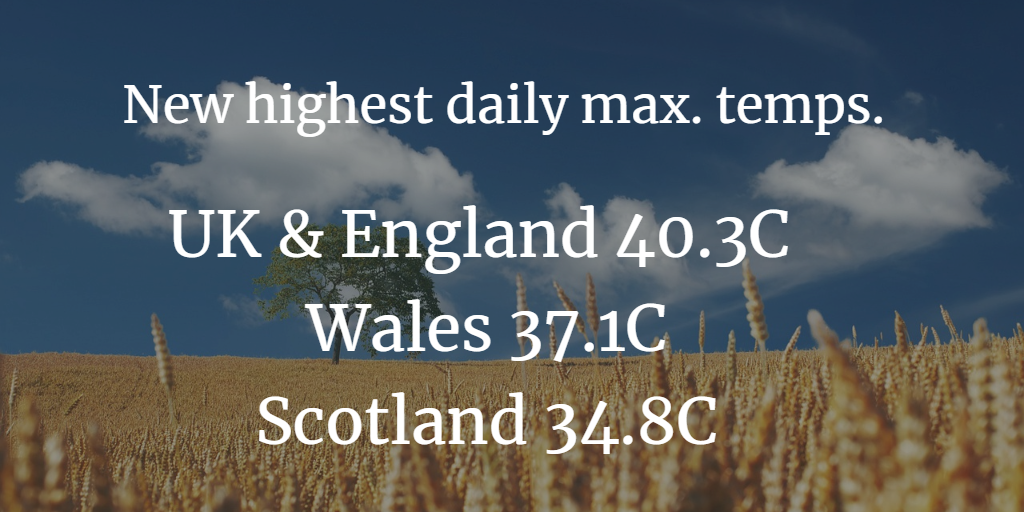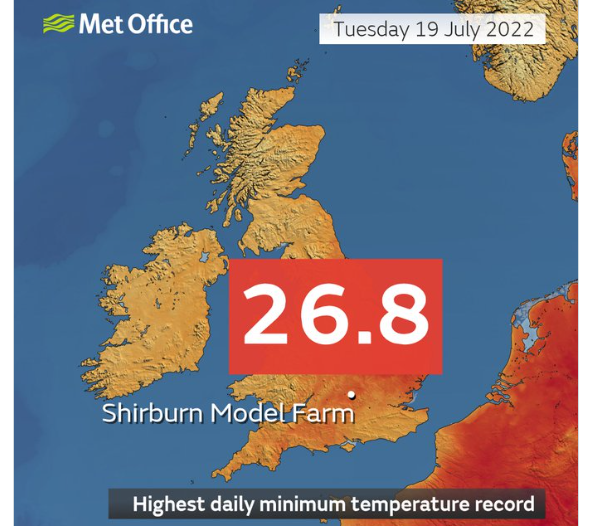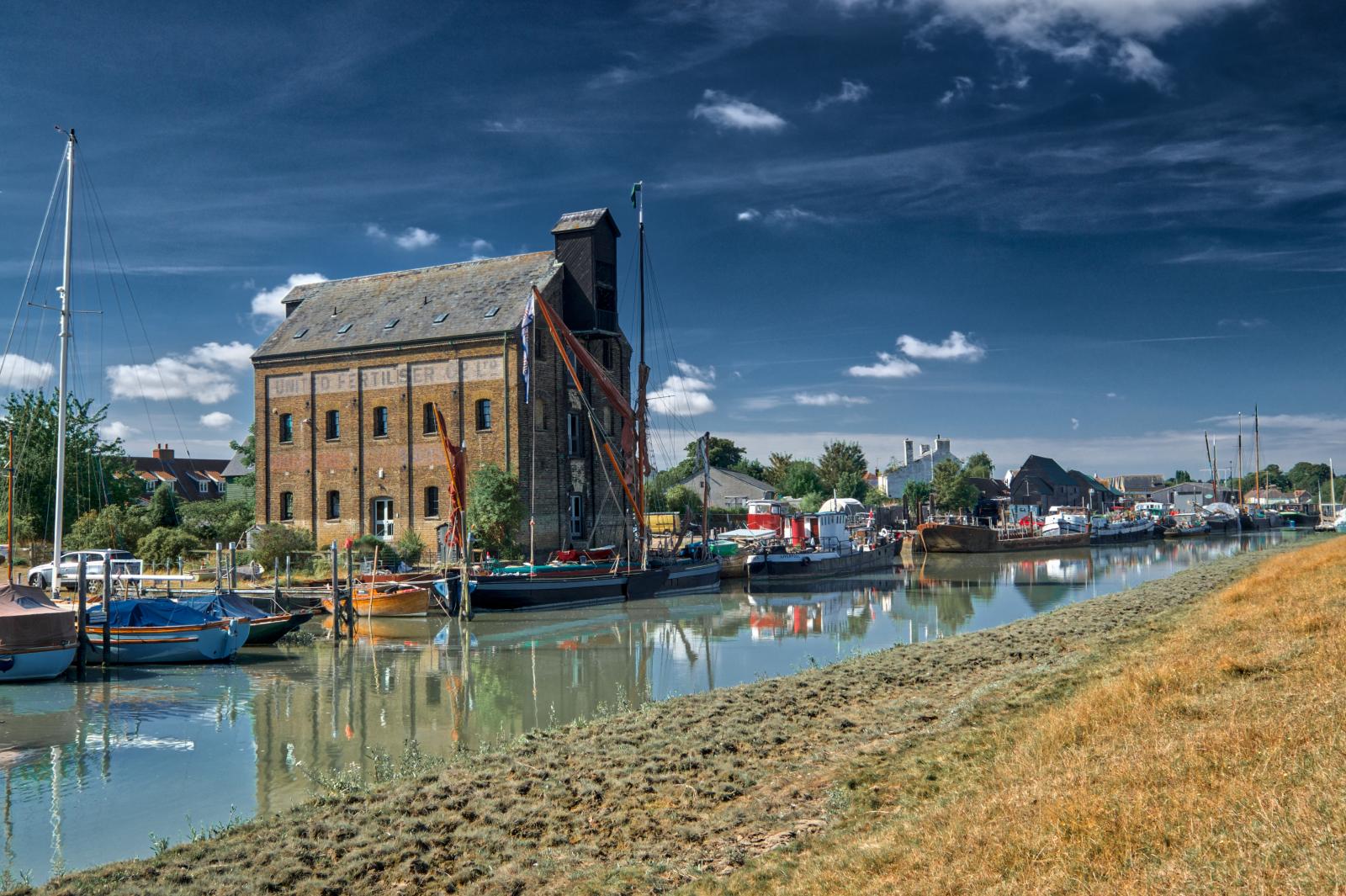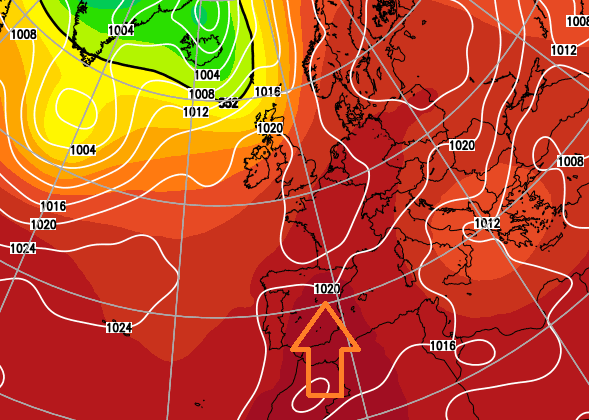
How hot has it been in the UK? Temperatures do pass the 35C mark occasionally here in the UK but it is unusual to reach the high 30s as in 2020, or pass 40C in 2022. What was the highest on record?
Update from September 2022

In a spell of exceptional heat, the UK passed 40C for the first time on record, with several sites recording 40+C. In the two days of Monday 18th and Tuesday 19th July 2022 there were new records for Wales, Scotland and England, by day and night. The UK highest temperature record was smashed at 40.3C (104.5F) in Coningsby, Lincolnshire.
Wales saw a new all-time high of 37.1C at Hawarden Airport, Flintshire on 18th July 2022. Wales also saw a new record high daily minimum temperature of 24.5°C at Aberporth on 19th July. So the hottest Welsh night followed the hottest Welsh day. For Scotland, a high of 34.8C at Charterhall in the Scottish Borders on 19th July.
There was also a new highest daily minimum temperature record in the same unprecedented hot spell. A low of 26.8°C was recorded at Shirburn Model Farm in Oxfordshire on 19th July 2022 at 04:32AM. This means that the temperature never got below 26.8°C during a 24 hour period. 27C by day would be considered a warm day for many parts of the UK, never mind it being the minimum seen overnight.

40.3C - 19 July 2022 Coningsby
38.7°C - 25 July 2019 Cambridge
38.5°C - 10 Aug 2003 Faversham
38.1C - 18 July 2022 Santon Downham
37.8°C – 31 July 2020 London Heathrow
37.1°C - 3 Aug 1990 Cheltenham
36.7°C - 1 Jul 2015 London Heathrow
36.7°C - 9 Aug 1911 Raunds
36.6°C - 2 Aug 1990 Worcester
36.5°C - 19 Jul 2006 Wisley
-------
Previously
In the middle of summer 2019, very warm air surged up from Europe and the UK saw a maximum temperature of 38.7C (101.66F) on the 25th July. The hottest day ever in the UK, with the top temperature being recorded at Cambridge Botanic Gardens. After that spell of intense heat, there were dramatic thunderstorms over parts of Britain.
July 2019 wasn’t hot overall, it was slightly warmer than average across the UK. It was 2018 when the UK endured a lengthy hot and dry spell with average temperatures being several degrees higher, particularly for England and Wales in July.
Before that, the UK record was 38.5C (101.3F) from the 10th August 2003, recorded at Faversham in Kent and this remains the hottest August day for the UK. August 2003 was hotter and much drier than average.
 Faversham, Kent
Faversham, Kent
Summer 2020 has only just got going with heat and sunshine, after a mixed and unsettled June and July, following the warm, dry and sunny conditions of COVID lockdown in spring 2020. The UK doesn’t often see temperatures over 35C but saw the 3rd hottest UK day on record on 31st July 2020 with 37.8C (100F) and has recorded 36.4C on the 7th August.
The last day of July 2020 produced an intense short-lived spike in air temperature. 37.8C was recorded at London Heathrow and 37.4C at Kew Gardens also in west London. The tarmacked runways of Heathrow airport are sometimes questioned, that it isn’t a representative temperature of what people are experiencing. However, the corroboration with Kew Gardens observations shows that Greater London is getting that hot.
As temperature records continue to fall around the world, the idea that the UK could reach 40C seems more of a ‘when’ than an ‘if’.
What was unusual about the 31st of July was that there was little build-up with the temperatures. Usually, the heat increases over a few days, with some sultry nights, the concrete in the city buildings holds onto that warmth and a top temperature is worked up to. This one just appeared suddenly, although Surrey and Lincolnshire did record 3 hot days in a row.
A week later August 2020 produced another hot spell but a longer one. Official heatwave conditions for more of England and Wales, particularly SE and eastern England. “Temperatures reaching or passing a location based threshold for three days or more.”

On Friday 7th August, London Heathrow and Kew Gardens reached 36.4C (97.5F) becoming the 9th hottest day on record for the UK. Medium level cloud just reached Greater London later in the afternoon stopping any further rise. Overnight, the highest minimum air temperature was 22.3C at Landon Bay in Kent. So, it didn’t get any“cooler” than 22C during the night, how was sleeping in that? The record for the highest minimum temperature is 23.9C on 3rd August 1990 in Brighton. These are UK “Tropical Nights”. The term describes days when the temperature does not fall under 20.0° C during the night-time. It doesn’t happen that often and is localised but the UK Met Office began tracking them in 2018 as extra data for climate research.
Public Health England issued a Heat-Heath warning which requires social and healthcare services to target specific actions at high-risk groups. This was proper summer heat.
Advice in hot weather - Look out for others, especially older people, young children and babies and those with underlying health conditions. Close curtains on rooms that face the sun to keep indoor spaces cooler and remember it may be cooler outdoors than indoors. Drink plenty of fluids and avoid excess alcohol, dress appropriately for the weather and slow down when it is hot.
Hot weather can be welcomed and enjoyed by many people but for others, it can be overwhelming or cause extra stress to pre-existing health conditions. Air pollution episodes can also occur in hot weather with ozone levels rising in strong sunshine heightening risk for people with heart and lung conditions. Pollen levels can be high and the relentless heat with perhaps lack of sleep can affect people’s mood. However, for others, the warmth and sunshine generate a feeling of wellbeing and happiness with more opportunities to be outdoors. Here in the UK, the extreme heat doesn’t tend to last for too long, often ending with a thundery breakdown. Thunderstorms are forecast for the start of next week as the heat continues in the south.